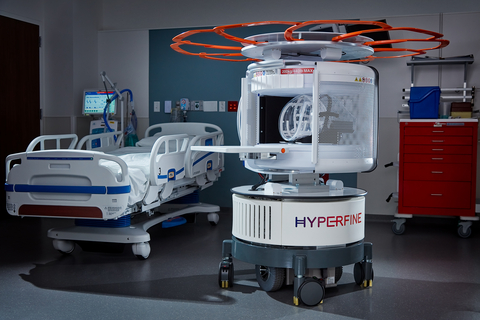MADRID– Hyperfine, Inc. (Nasdaq: HYPR), the groundbreaking health technology company that has redefined brain imaging with the first FDA-cleared portable magnetic resonance (MR) brain imaging system—the Swoop® system—today announced the presentation of additional research data and images using the Swoop® system to image patients with Alzheimer’s disease who are part of the observational, investigator-initiated CARE PMR study.
The Swoop® system is gaining international exposure, with growing evidence supporting the use of Swoop® system images to help in the detection of amyloid-related imaging abnormalities (ARIA-E) when monitoring Alzheimer’s patients receiving amyloid-targeting therapy. Recent presentations at significant Alzheimer’s meetings, including the Alzheimer’s Association International Conference (AAIC) in Philadelphia, AAIC in Tokyo, and the Clinical Trials on Alzheimer’s Disease (CTAD) conference in Madrid (presented on October 31st), have showcased the potential value of the Swoop® system in Alzheimer’s patient management.
The presentation today at CTAD featured research from Washington University in St. Louis, a leading center in Alzheimer’s disease research using ultra-low-field MR imaging with the Swoop® system and an actively enrolling center in the CARE PMR study. The authors shared their experiences using Swoop® system images to detect ARIA-E in patients undergoing Lecanemab therapy. The presentation showcased multiple cases comparing images obtained with the ultra-low-field Swoop® portable MR brain imaging system with images from a high-field 3 tesla MRI scanner. The Swoop® system images, processed using the latest advancements in AI-driven research software, demonstrated impressive image quality that shows promise for use in assisting physicians in detecting ARIA-E.
The presentation conclusions stated that the Swoop system “presents a promising and cost-effective alternative to the conventional 3T MRI, with the added advantage of workflow optimization.” Further, the authors noted, “This study highlights the potential of innovative imaging technologies to advance patient care and monitor neurodegenerative conditions.”
The CARE PMR (Capturing ARIA Risk Equitably with Portable MR) study is a collection of data from multiple sites assessing the clinical utility and workflow benefits of using Swoop® system images to detect amyloid-related imaging abnormalities (ARIA) in Alzheimer’s patients receiving amyloid-targeting therapy.
Dr. Edmond Knopp, Chief Medical Officer at Hyperfine, expressed his enthusiasm for the ongoing research. He stated, “I want to congratulate Washington University for their leadership in Alzheimer’s research, particularly with the use of portable MR brain imaging. The impressive image quality achievable with our ultra-low-field MRI technology opens up the potential to enable the ability to provide critical diagnostic information for patients with Alzheimer’s disease across many sites of professional care, including infusion centers and clinics that currently cannot offer on-site imaging capabilities. These presentations provide early evidence that portable MRI could transform Alzheimer’s disease management.”


